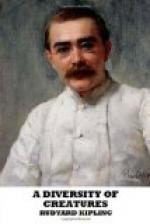‘Yes. I allus heard he paints his bee-skeps,’ Jabez put in. ’I dunno paint don’t tarrify bees more’n it keeps em’ dry.’
‘"I’ll have a pook at it,” he ses, an’ he pooks at it as it comes round the elber. The roosh nigh jerked the pooker out of his hand-grips, an’ he calls to me, an’ I come runnin’ barefoot. Then we pulled on the pooker, an’ it reared up on eend in the roosh, an’ we guessed what ’twas. ‘Cardenly we pulled it in into a shaller, an’ it rolled a piece, an’ a great old stiff man’s arm nigh hit me in the face. Then we was sure. “’Tis a man,” ses Jim. But the face was all a mask. “I reckon it’s Mary’s Lunnon father,” he ses presently. “Lend me a match and I’ll make sure.” He never used baccy. We lit three matches one by another, well’s we could in the rain, an’ he cleaned off some o’ the slob with a tussick o’ grass. “Yes,” he ses. “It’s Mary’s Lunnon father. He won’t tarrify us no more. D’you want him, Jesse?” he ses.
’"No,” I ses. “If this was Eastbourne beach like, he’d be half-a-crown apiece to us ‘fore the coroner; but now we’d only lose a day havin’ to ’tend the inquest. I lay he fell into the brook.”
’"I lay he did,” ses Jim. “I wonder if he saw mother.” He turns him over, an’ opens his coat and puts his fingers in the waistcoat pocket an’ starts laughin’. “He’s seen mother, right enough,” he ses. “An’ he’s got the best of her, too. She won’t be able to crow no more over me ‘bout givin’ him money. I never give him more than a sovereign. She’s give him two!” an’ he trousers ’em, laughin’ all the time. “An’ now we’ll pook him back again, for I’ve done with him,” he ses.
‘So we pooked him back into the middle of the brook, an’ we saw he went round the elber ‘thout balkin’, an’ we walked quite a piece beside of him to set him on his ways. When we couldn’t see no more, we went home by the high road, because we knowed the brook ’u’d be out acrost the medders, an’ we wasn’t goin’ to hunt for Jim’s little rotten old bridge in that dark—an’ rainin’ Heavens’ hard, too. I was middlin’ pleased to see light an’ vittles again when we got home. Jim he pressed me to come insides for a drink. He don’t drink in a generality, but he was rid of all his troubles that evenin’, d’ye see? “Mother,” he ses so soon as the door ope’d, “have you seen him?” She whips out her slate an’ writes down—“No.” “Oh, no,” ses Jim. “You don’t get out of it that way, mother. I lay you have seen him, an’ I lay he’s bested you for all your talk, same as he bested me. Make a clean breast of it, mother,” he ses. “He got round you too.” She was goin’ for the slate again, but he stops her. “It’s all right, mother,” he ses. “I’ve seen him sense you have, an’ he won’t trouble us no more.” The old lady looks up quick as a robin, an’ she writes, “Did he say so?” “No,” ses Jim, laughin’. “He didn’t say so. That’s how I know. But he bested you, mother. You can’t have it in at me for bein’ soft-hearted. You’re twice as tender-hearted as what I be. Look!” he ses, an’ he shows her the two sovereigns. “Put ’em away where they belong,” he ses. “He won’t never come for no more; an’ now we’ll have our drink,” he ses, “for we’ve earned it.”




